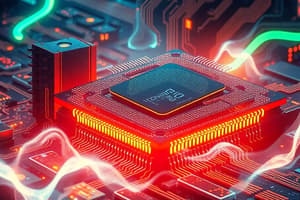Podcast
Questions and Answers
What is the fundamental operation sequence of a computer?
What is the fundamental operation sequence of a computer?
- Input, Storage, Process
- Process, Input, Output
- Input, Output, Storage
- Input, Process, Output (correct)
Data is the same as information.
Data is the same as information.
False (B)
What is a computer?
What is a computer?
A computer is a programmable electronic device that performs activities involving mathematical, logical, and graphical manipulations.
Computers were originally operated by ______, who calculated mathematical expressions.
Computers were originally operated by ______, who calculated mathematical expressions.
Match the following terms with their definitions:
Match the following terms with their definitions:
Which of the following is NOT a type of computer hardware?
Which of the following is NOT a type of computer hardware?
Computer science includes only the study of hardware.
Computer science includes only the study of hardware.
What year was the word 'computer' first recorded?
What year was the word 'computer' first recorded?
Name one application area of computers.
Name one application area of computers.
Tally sticks were used as a memory aid to record numbers and messages.
Tally sticks were used as a memory aid to record numbers and messages.
Who invented Napier's Bones and in what year?
Who invented Napier's Bones and in what year?
An ______ is a mechanical device used to aid in performing mathematical calculations.
An ______ is a mechanical device used to aid in performing mathematical calculations.
Match the following advantages of computers with their descriptions:
Match the following advantages of computers with their descriptions:
Which of the following is a limitation of computers?
Which of the following is a limitation of computers?
Computers can perform millions of calculations instantly.
Computers can perform millions of calculations instantly.
What is the primary use of a Difference Engine?
What is the primary use of a Difference Engine?
Flashcards
What is a Computer?
What is a Computer?
A programmable electronic device that performs mathematical, logical, and graphical operations under the control of instructions stored in its memory.
What is Data?
What is Data?
The raw facts, figures, and symbols that need to be processed.
What is Information?
What is Information?
Data that has been processed and presented in an organized and meaningful way.
What is a Program?
What is a Program?
Signup and view all the flashcards
What is Computer Science?
What is Computer Science?
Signup and view all the flashcards
What is an Input Device?
What is an Input Device?
Signup and view all the flashcards
What is a Storage Device?
What is a Storage Device?
Signup and view all the flashcards
What is an Output Device?
What is an Output Device?
Signup and view all the flashcards
Tally Sticks
Tally Sticks
Signup and view all the flashcards
Abacus
Abacus
Signup and view all the flashcards
Napier's Bones
Napier's Bones
Signup and view all the flashcards
Slide Rule
Slide Rule
Signup and view all the flashcards
Pascaline
Pascaline
Signup and view all the flashcards
Stepped Reckoner
Stepped Reckoner
Signup and view all the flashcards
Jacquard Loom
Jacquard Loom
Signup and view all the flashcards
Difference Engine
Difference Engine
Signup and view all the flashcards
Study Notes
Introduction to Computers
- Lecture 1, COS/CSC 101/111, Lagos State University
- Dr. Zubair Adam, Department of Computer Science
- Course focuses on introducing and discussing the history of computers
- Course outline includes: overview, computer and computer science, data, information, and instructions, history of computers, and advantages/limitations
Overview
- Introduction to & History of Computer
- Basic Computer Configuration
- Hardware (Input, Storage, Output Devices)
- Software (Operating System, Application Software)
- Internet
- Using personal computers for problem-solving
- Computer application areas and technological trends
Computer and Computer Science
- What is a Computer? A programmable electronic device for mathematical, logical, and graphical manipulations, operating under instructions stored in its memory
- Computer: Any electronic device aiding humans in computations and calculations.
- Fundamental Operations: Receives data & instructions from input devices, processes data according to instructions; provides results (output) in a desired form.
- Computer Science: The study of computers and computing, including their theoretical and algorithmic foundations, hardware, software, and their uses for processing information.
Data, Information, and Instructions
- Data: Raw facts, figures, and symbols (e.g., student names and marks)
- Information: Processed and organized data (e.g., student names ordered alphabetically, calculated total marks and averages)
- Program: A set of instructions enabling a computer to perform tasks.
History of Computers
- Originally, calculations were done by humans.
- "Computer" as a person, 1613.
- Specialized and costly calculations, years of training
- Early Calculating Devices:
- Tally Sticks: An ancient memory aid device to record and document numbers, quantities, or even messages.
- Abacus: A mechanical device aiding in mathematical calculations.
- Napier's Bones: A device to multiply, divide and calculate square and cube roots by moving rods around specially constructed boards by John Napier in 1614.
History of Computer Generations
- First Generation (1946-1954): Vacuum tubes
- Second Generation (1955-1965): Transistors
- Third Generation (1968-1975): Integrated Circuits (IC)
- Fourth Generation (1976-1980): Very Large Scale Integrated Circuits (VLSI)
- Fifth Generation (1980-Today): Ultra Scale Integrated Circuits (ULSI), Microprocessor (Silicon Chip)
Assignment
- Short note on each device including year of invention and uses:
- Slide Rule
- Pascaline
- Stepped Reckoner
- Jacquard Loom
- Arithmometer
- Difference Engine
- Analytical Engine
Advantages of Computers
- High speed: Perform tasks faster than humans
- Accuracy: Ensure accuracy in calculations
- Storage: Store large amounts of information reliably.
- Automation: Perform complex tasks automatically.
- Diligence: Repeat tasks without fatigue.
- Versatility: Perform simple and complex tasks.
- Cost-effectiveness: Reduce paperwork and human effort
Limitations of Computers
- Requires clear & complete instructions. Incorrect instructions yield incorrect results.
- Cannot think.
- Cannot learn from experience.
Studying That Suits You
Use AI to generate personalized quizzes and flashcards to suit your learning preferences.



